牛津译林版(2019)选择性必修一 U1 Food matters Grammar & usage(38张PPT)
文档属性
| 名称 | 牛津译林版(2019)选择性必修一 U1 Food matters Grammar & usage(38张PPT) |
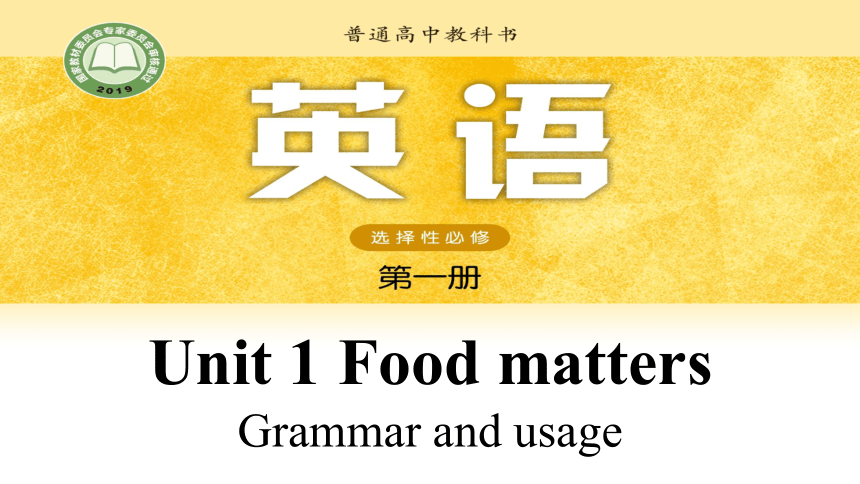
|
|
| 格式 | zip | ||
| 文件大小 | 4.3MB | ||
| 资源类型 | 试卷 | ||
| 版本资源 | 牛津译林版(2019) | ||
| 科目 | 英语 | ||
| 更新时间 | 2021-09-21 16:35:17 | ||
图片预览

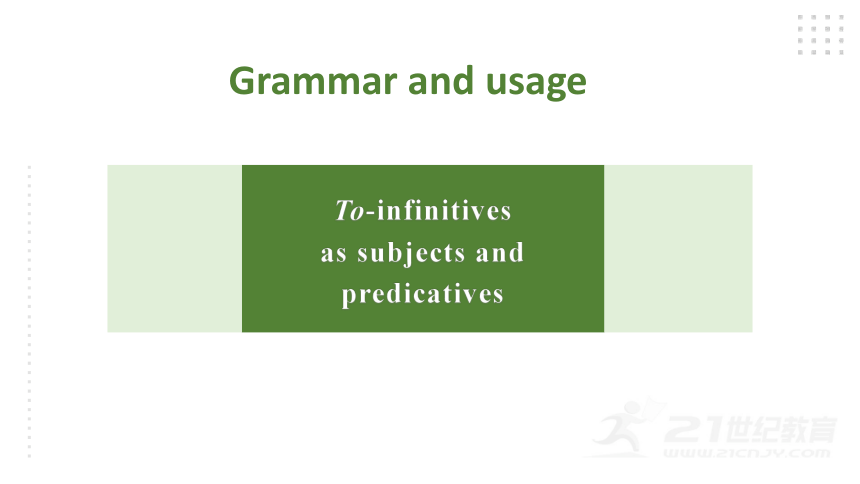
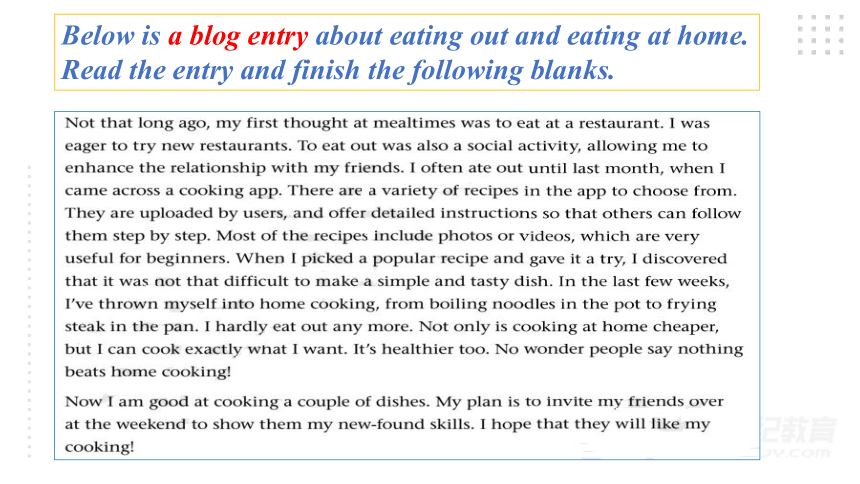
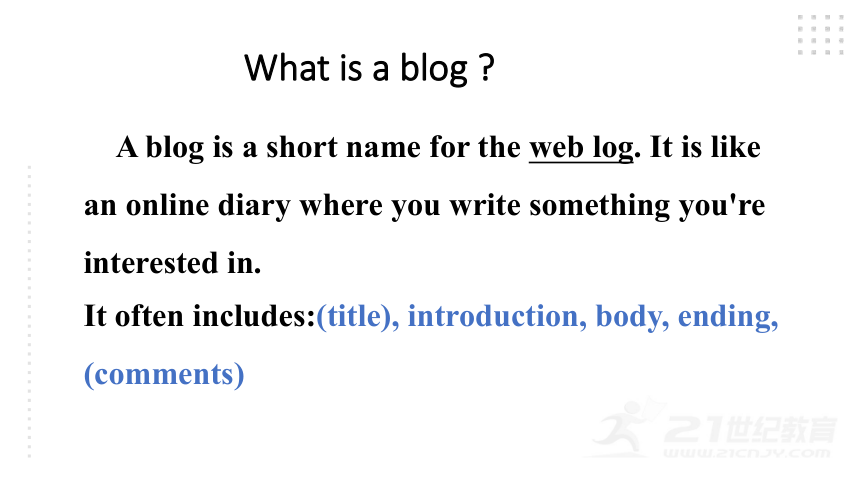
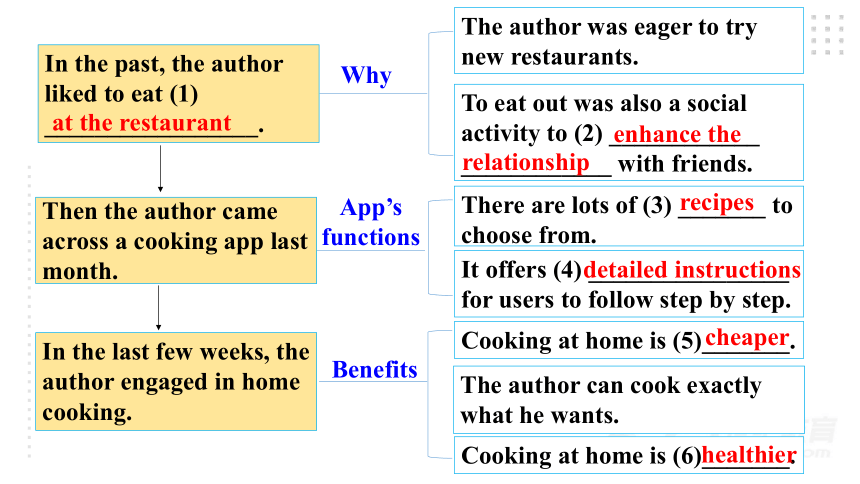
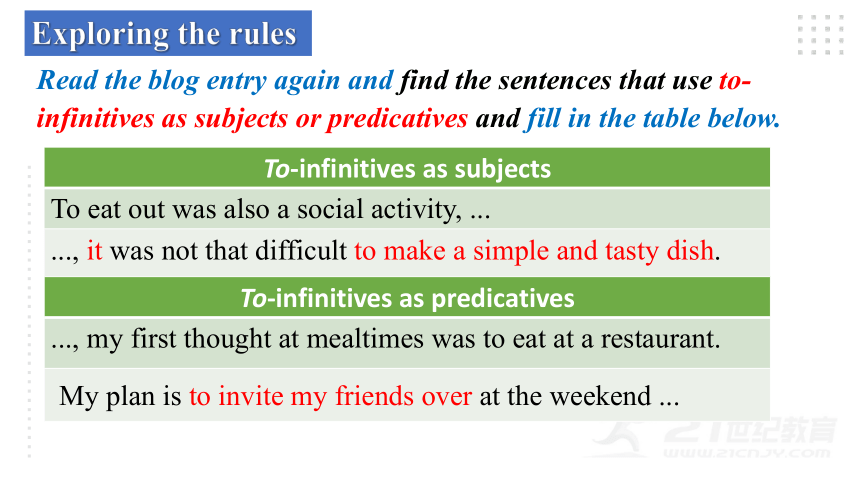
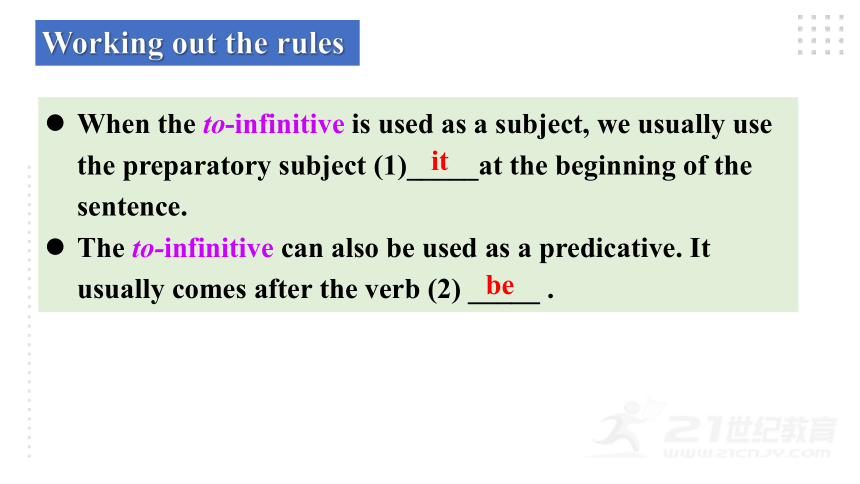
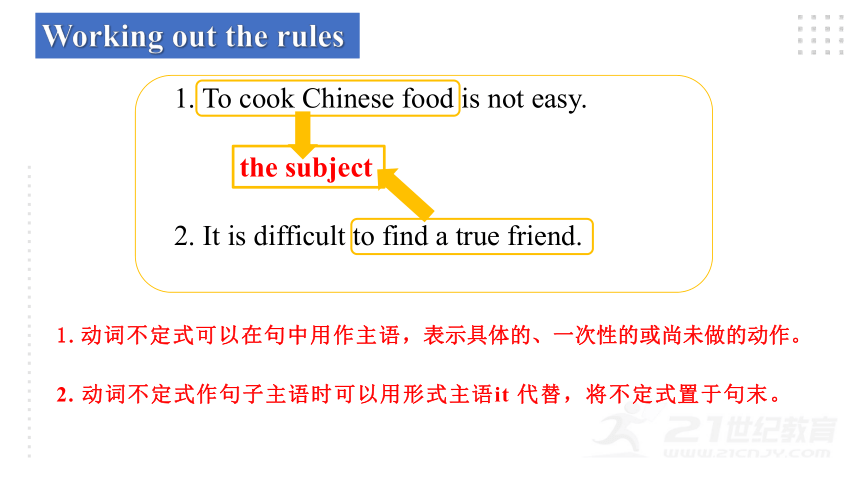
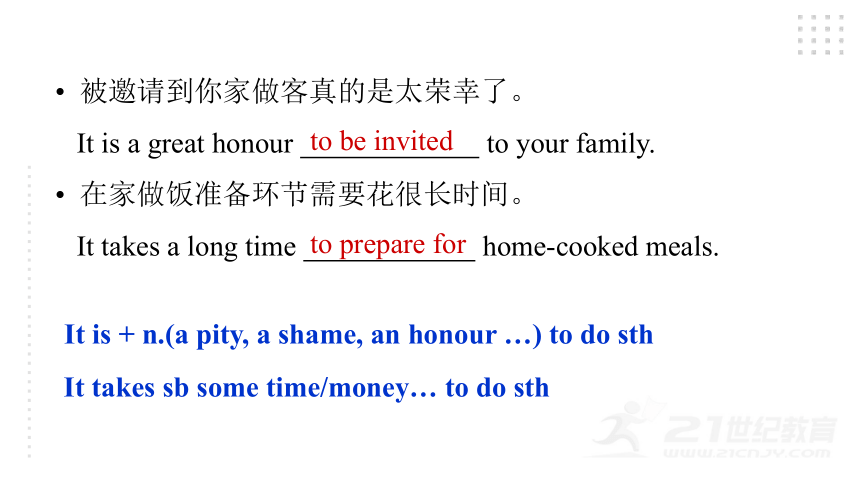

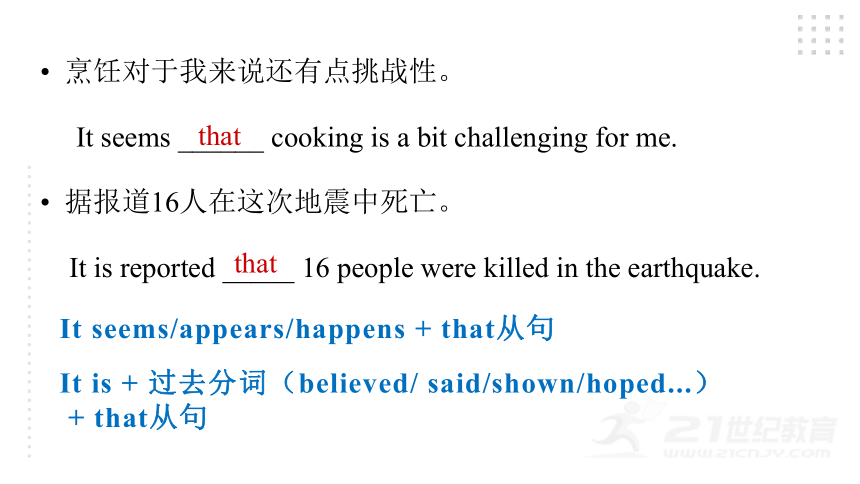
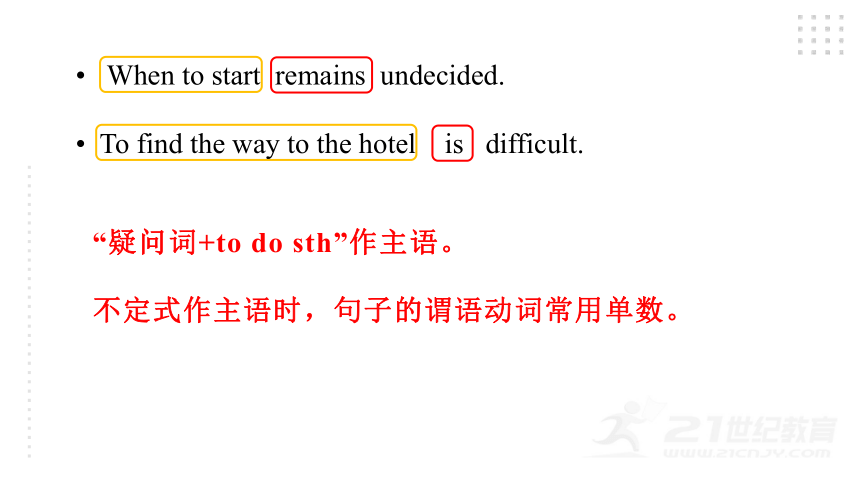
文档简介
(共38张PPT)
Unit
1
Food
matters
Grammar
and
usage
Grammar
and
usage
Below
is
a
blog
entry
about
eating
out
and
eating
at
home.
Read
the
entry
and
finish
the
following
blanks.
What
is
a
blog
?
A
blog
is
a
short
name
for
the
web
log.
It
is
like
an
online
diary
where
you
write
something
you're
interested
in.
It
often
includes:(title),
introduction,
body,
ending,
(comments)
App’s
functions
Cooking
at
home
is
(5)_______.
In
the
last
few
weeks,
the
author
engaged
in
home
cooking.
Benefits
In
the
past,
the
author
liked
to
eat
(1)
_________________.
Why
The
author
was
eager
to
try
new
restaurants.
To
eat
out
was
also
a
social
activity
to
(2)
____________
____________
with
friends.
Then
the
author
came
across
a
cooking
app
last
month.
There
are
lots
of
(3)
_______
to
choose
from.
It
offers
(4)
________________
for
users
to
follow
step
by
step.
The
author
can
cook
exactly
what
he
wants.
Cooking
at
home
is
(6)_______.
at
the
restaurant
enhance
the
recipes
detailed
instructions
cheaper
healthier
relationship
To-infinitives
as
subjects
To
eat
out
was
also
a
social
activity,
...
...,
it
was
not
that
difficult
to
make
a
simple
and
tasty
dish.
To-infinitives
as
predicatives
...,
my
first
thought
at
mealtimes
was
to
eat
at
a
restaurant.
My
plan
is
to
invite
my
friends
over
at
the
weekend
...
Exploring
the
rules
Read
the
blog
entry
again
and
find
the
sentences
that
use
to-infinitives
as
subjects
or
predicatives
and
fill
in
the
table
below.
When
the
to-infinitive
is
used
as
a
subject,
we
usually
use
the
preparatory
subject
(1)_____at
the
beginning
of
the
sentence.
The
to-infinitive
can
also
be
used
as
a
predicative.
It
usually
comes
after
the
verb
(2)
_____
.
it
be
Working
out
the
rules
1.
To
cook
Chinese
food
is
not
easy.
2.
It
is
difficult
to
find
a
true
friend.
the
subject
1.动词不定式可以在句中用作主语,表示具体的、一次性的或尚未做的动作。
2.
动词不定式作句子主语时可以用形式主语it
代替,将不定式置于句末。
Working
out
the
rules
?
被邀请到你家做客真的是太荣幸了。
It
is
a
great
honour
to
your
family.
?
在家做饭准备环节需要花很长时间。
It
takes
a
long
time
home-cooked
meals.
to
be
invited
to
prepare
for
It
is
+
n.(a
pity,
a
shame,
an
honour
…)
to
do
sth
It
takes
sb
some
time/money…
to
do
sth
?
你为我们做了这么多美味的菜真的是太好了。
It
is
nice
____
you
_______
so
many
tasty
dishes
for
us.
?
在当今社会,我们学会做饭还是很有用的。
It
is
useful
_____
us
.
to
learn
how
to
cook
for
to
make
It
is
+
adj.+
for/of
sb
to
do
sth
of
(如
good/
kind/
nice/
clever/
foolish/
selfish…)
(如easy
/
difficult
/
hard
/
unwise
/
possible/
necessary…)
?
烹饪对于我来说还有点挑战性。
It
seems
______
cooking
is
a
bit
challenging
for
me.
?
据报道16人在这次地震中死亡。
It
is
reported
_____
16
people
were
killed
in
the
earthquake.
that
that
It
seems/appears/happens
+
that从句
It
is
+
过去分词(believed/
said/shown/hoped...)
+
that从句
?
When
to
start
remains
undecided.
?
To
find
the
way
to
the
hotel
is
difficult.
“疑问词+to
do
sth”作主语。
不定式作主语时,句子的谓语动词常用单数。
不定式作表语:常___________的动作或状态。
注意:如果主语是以aim,duty,hope,idea,job,plan,problem,purpose,thing,wish
等为中心的名词,不定式作表语对主语的内容做具体说明作用。
His
wish
is
________
(buy)
a
car
in
the
near
future.
to
buy
1.
Her
wish
is
to
become
a
lawyer.
表示将来
当主语部分有实义动词do时,作表语的动词不定式可以省略to。
2.
All
we
could
do
was
_______________.
(回家)
All
I
want
to
do
now
is
______________.(休息)
(to)
go
back
home
(to)
have
a
rest
to-infinitive
as
a
predicative
Now
your
first
important
task
is_________(take)
good
care
of
the
wounded
soldier.
2.
The
purpose
of
developing
new
technologies
is_________(make)
life
easier.
3.
What
we
need
to
do
at
this
critical
moment
is_____(stay)
at
home
and
not
meet
people
face-to-face.
4.
The
duty
of
soldiers
is________(
defend)
their
motherland
and
protect
their
families.
5.There
is
a
famous
saying,
“To
see
is
________
(believe).”
6.
_______
(save)
time
is
to
lengthen
life.
7.
It's
a
great
honour
for
me_______________(invite)
and
make
a
speech
here.
8.
It
requires
a
great
deal
of
memorizing
work__________(master)
a
foreign
language.
10.
It
took
the
designer
three
whole
days____________(complete)
that
program.
Exercises
to
take
stay
to
make
to
believe
to
defend
To
save
to
be
invited
to
master
to
complete
1.
His
dream
is
_________________________
.
他的梦想时有一天成为一名伟大的足球运动员
3.
Her
work
is
_______
(work)
in
the
nursing
home
everyday.
4.
It
is
necessary
for
everyone_________________________.
每个人都有必要为未来的生活做计划。
5.It
is
important
for
everyone__________________________.
学习并掌握一些实用的技能对每个人而言都是很重要的
to
make
plans
for
the
future
to
work
to
be
a
great
football
player
to
master
some
practical
skills
1.
To
eat
out
was
also
a
social
activity,
allowing
me
to
enhance
the
relationship
with
my
friends.
2.
There
are
a
variety
of
recipes
on
the
app
to
choose
from.
3.
My
plan
is
to
invite
my
friends
over
at
the
weekend
to
show
them
my
new-found
skills.
Work
in
pairs.
Identify
what
the
to-infinitives
function
as
in
the
following
sentences
from
the
blog
entry
of
Part
A.
adverbial
of
purpose
attributive
object
complement
Practice:
判断不定式在下列句子中作何成分
1.
I
went
to
the
annual
earthquake
workshop
to
learn
some
safety
tips.
2.
The
authorities
told
the
local
people
to
stay
inside
when
the
typhoon
arrived.
3.
They
arrived
at
the
airport
only
to
find
the
flight
had
been
cancelled
due
to
the
snowstorm.
4.
Before
we
returned
home,
the
flood
damage
needed
to
be
repaired
5.
This
was
the
last
city
to
be
cleared
of
people
before
the
volcano
erupted.
1.
作目的状语
2.
作宾语补足语
3.
作结果状语
4.
作宾语
5.
作定语
Rewrite
the
following
sentences
using
to-infinitives
according
to
the
requirements
in
the
brackets.
1.
The
next
dish
that
the
cook
will
prepare
is
Kung
Pao
Chicken.
(attributive)
2.
The
preparation
of
home-cooked
meals
is
easy
and
enjoyable.
(subject)
3.
Her
dream
is
that
she
will
open
a
restaurant
some
day.
(predicative)
The
next
dish
to
be
prepared
by
the
cook
is
Kung
Pao
Chicken.
To
prepare
home-cooked
meals
is
easy
and
enjoyable./
It
is
easy
and
enjoyable
to
prepare
home-cooked
meals.
Her
dream
is
to
open
a
restaurant
some
day.
Applying
the
rules
B
1
4.
We
will
put
the
potatoes
in
the
pot
first
in
order
that
they
will
be
cooked
quickly.(adverbial
of
purpose)
5.
I
consider
the
Soup
of
the
Day
as
the
best
option
on
the
menu.
(object
complement)
We
will
put
the
potatoes
in
the
pot
first
(in
order)
to
cook
them
quickly.
I
consider
the
Soup
of
the
Day
to
be
the
best
option
on
the
menu.
Located
to
see
to
turn
to
sit
painted
ranging
to
invite
to
be
Applying
the
rules
B
2
Complete
the
article
with
the
correct
forms
of
the
verbs
in
the
brackets.
动词不定式的基本结构
主动形式
被动形式
一般式
to
do
to
be
done
完成式
to
have
done
to
have
been
done
进行式
to
be
doing
无
完成进行式
to
have
been
doing
无
Revision
1.
不定式的动作与谓语动词同时发生时,或之后发生
用一般时态
1)
He
wanted
________
(see)
you.
2)
I
hope
________(see)
you
again.
2.
强调不定式的动作正在进行时,用进行时态
When
I
came
in,
he
pretended
(read)
a
book.
3.
强调
不定式的动作在谓语动词之前发生时,用不定式完成时
He
is
said
_________________
(write)
a
novel
last
year.
4.
强调动作从过去某时开始,一直延续到现在,并可能持续下去时,
用完成进行式
She
is
said
(work)
on
the
problem
for
many
years.
to
see
to
see
to
be
reading
to
have
written
to
have
been
working
一、不定式的各种时态用法
当不定式的逻辑主语是不定式的承受者时,用被动语态
It
is
an
honor
for
me
to
be
invited
to
speak
here
.
She
asked
______________
(send)
to
work
in
Tibet
.
The
book
is
said
________________________
(translate)
into
English.
to
be
sent
to
have
been
translated
二、不定式被动语态的用法
3.
作宾语:下列动词ask,
agree,
choose,
demand,
decide,
expect,
fail,
hope,
learn,
manage,
offer,
plan,
pretend,
promise,
refuse,
afford,
want,
wish等只能用动词不定式作宾语。
①
I
can’t
afford
________
(buy)
a
car.
②Have
you
learnt
__________
(drive)
a
car?
③The
stranger
offered
_________
(show)
me
the
way.
④
Mr
Smith
asked
__________
(send)
to
serve
in
the
army.
⑤The
patient
desired
_________(tell)
the
truth.
to
buy
to
drive
to
show
to
be
sent
to
be
told
Presentation
注意:
1)某些及物动词可用-ing也可用动词不定式作宾语,
但意义不同:
stop/
go
on/
remember/
forget/
regret/
try/
mean
stop
to
do
与
stop
doing
mean
to
do
与
mean
doing
forget
to
do
与
forget
doing/having
done
regret
to
do
与
regret
doing/having
done
2)某些及物动词think,
believe,
consider,
feel,
find,
make等后常用it作形式宾语(6123句型)。
Language
points
1.The
teacher
is
coming,
let’s
stop
_________
(talk).
2.She
tried
_________
(read),
but
couldn’t
make
her
forget
her
trouble.
3.He
forgot
even
________
(write)
to
me,
so
he
wrote
another
one.
4.I
remember
_______
(bring)
the
book
to
you
last
week.
5.I
regret
________
(tell)
that
we
can’t
take
your
advice.
6.We
think
____
important
______
obey
the
law.
7.I
know
_____
impossible
_____
finish
so
much
homework
in
a
day.
talking
reading
writing
bringing
to
tell
it
it
to
to
4.作定语:不定式做定语时一般修饰将要去做的事
②当名词被the
first,
the
last,
the
only,
the
very,
the
next等词以及形容词最高级修饰时,常用不定式作后置定语。
She
is
always
the
first_________
(come)
and
the
last
________(leave).
①
something,
anything,
nothing,
everything等复合不定代词常用不
定式作后置定语。
I
have
something
______
(tell)
you.
to
come
to
leave
to
tell
The
meeting
________
(hold)
tomorrow
is
very
important.
to
be
held
With
a
lot
of
homework
________
(finish),
the
sleepy
boy
can’t
go
to
sleep
as
he
wishes.
to
finish
③
抽象名词time,
way,
ability,
reason,
chance,
courage,
opportunity,
plan,
wish,
right,
effort,
failure,
attempt,
promise,
decision等后用不定式作后置定语。
You
still
have
a
chance
______
(win)
the
game.
④如果不定式是不及物动词,
则后面加适当的介词。
Please
pass
me
some
paper
to
write
_____.
to
win
on
Excuse
me,could
I
use
your
pen
for
a
moment?
I
have
no
pen
to
write
______.
with
5.作状语
表示目的、原因、结果或条件。
I
came
here
to
see
you.
We
were
very
excited
to
hear
the
news.
He
hurried
to
the
school
only
to
find
nobody
there
.
To
look
at
him,you
would
like
him.
(目的)
(原因)
(结果)
(条件)
1)不定式做目的状语,相当于用in
order
to,so
as
to(不放句首)引导的目的状语。
The
doctor
did
everything
he
could
_______
(save)
the
patient.
Every
minute
is
made
full
use
of
________
(study)
our
lessons.
to
save
to
study
___________the
first
bus,
he
got
up
early.
To
catch
up
2)不定式可以用来做结果状语,常用enough
to,only
to,never
to,so
+
形容词/副词
+
as
to,too...to
引导。
Would
you
be
so
kind
as
to
step
this
way,
please?
I
tried
the
door,
only
to
find
it
locked
inside.
He
is
brave
enough
to
go
out
alone
at
night
.
He
hurried
to
the
station,
only
to
find
the
train
had
left.
3)不定式做原因状语主要用于表示情感或性格特征的形容词后,
如:glad,
sorry,
happy,
eager,
lucky,
fortunate,
willing,
angry,
foolish等。
After
the
strong
storm,
we
were
very
amazed
to
see
that
our
house
was
in
good
condition
and
our
grandparents
were
very
delighted
to
know
that
we
were
safe
and
sound.
6.作宾语补足语
如:tell
sb.to
do
sth
(不定式与宾语之间的关系是逻辑上的主谓关系)
advise
,allow
,ask
beg,
cause,expect
encourage
,force
get,
tell,
invite
order,
wish,?
want,
warn
,remind
promise
,permit
persuade
,request…
sb.
to
do
see
watch
look
at
hear
listen
to
feel
notice
observe
+
sb.
do
doing
done
make
let
have
?
sb.
+
The
lady
was
watched
___________
(leave)
her
room
silence.
He
made
the
boy
_________
(clean)
room.
Did
you
notice
anyone
__________
(enter)
my
room?
Though
he
had
often
made
his
little
sister______
(cry),
today
he
was
made
_______
(cry)
by
his
little
sister.
to
leave
clean
enter
cry
to
cry
1.
Tom
happened
___________
(pass)
by
when
they
spoke
ill
of
him.
2.
We
all
hope
_________
(become)
scientists.
3.
We
all
want
_______
(take)
part
in
the
sports
meet.
4.
I
happened
__________
(read)
the
article
when
he
asked
me
about
it.
5.
He
pretended
______
(be)
a
driver.
6.
When
the
father
came
home,
the
naughty
boy
pretended
_________
(do)
his
homework.
to
be
passing
to
become
to
take
to
have
read
to
be
to
be
doing
7.
He
is
said
to
_________
(write)
a
novel
now.
be
writing
Practice:
Fill
in
the
blanks
with
the
words
given.
8.
He
is
said
_____________
(send)
to
London
already.
9.
She
is
said
_________
(meet)
a
fairy
one
day.
10.
Alice
is
said
_________
(do)
her
homework
in
her
own
room
now.
to
have
been
sent
to
have
met
to
be
doing
六、Homework
用括号中动词不定式的适当形式填空。
1.
It’s
an
honour
for
me
____________(ask)
to
deliver
a
speech
at
the
meeting.
2.
We
found
them
__________
(work)
hard
all
the
time.
3.
I
don’t
like
myself
___________(praise)
like
that.
4.
She
was
glad
__________________(give)
a
chance
to
visit
this
beautiful
city.
5.
I
am
sorry
___________(keep)
you
waiting
so
long.
6.
This
poem
is
said
___________________(translate)
into
English
already.
7.
After
graduation
he
asked
_____________
(send)
to
work
in
the
countryside.
to
be
asked
working
to
be
praised
to
have
been
given
to
have
kept
to
have
been
translated
to
be
sent
8.
The
computer
is
difficult
_________(control).
9.
She
has
a
slight
headache
now.
She
seems
_____________
(catch)a
cold.
10.
I
am
going
to
have
the
orphan_____(live)
with
me
soon.
11.
They
did
nothing
but
_______(play)bridge
the
whole
day.
12.
We
failed
_______(get)
him_________(come)
to
the
party.
13.
What
I’d
like
________(do)
first
is
_______(read)today’s
newspaper.
14.
Who
is
_________(blame)?
15.
The
dog
ought______________
(feed)
hours
ago.
to
control
to
have
caught
live
play
to
get
to
come
to
do
(to)
read
to
blame
to
have
been
fed
16.
The
books
are
not
allowed
_________
(take)out
of
the
room.
17.
He
preferred
to
die
rather
than
______(give)
in.
to
be
taken
give
https://www.21cnjy.com/help/help_extract.php
Unit
1
Food
matters
Grammar
and
usage
Grammar
and
usage
Below
is
a
blog
entry
about
eating
out
and
eating
at
home.
Read
the
entry
and
finish
the
following
blanks.
What
is
a
blog
?
A
blog
is
a
short
name
for
the
web
log.
It
is
like
an
online
diary
where
you
write
something
you're
interested
in.
It
often
includes:(title),
introduction,
body,
ending,
(comments)
App’s
functions
Cooking
at
home
is
(5)_______.
In
the
last
few
weeks,
the
author
engaged
in
home
cooking.
Benefits
In
the
past,
the
author
liked
to
eat
(1)
_________________.
Why
The
author
was
eager
to
try
new
restaurants.
To
eat
out
was
also
a
social
activity
to
(2)
____________
____________
with
friends.
Then
the
author
came
across
a
cooking
app
last
month.
There
are
lots
of
(3)
_______
to
choose
from.
It
offers
(4)
________________
for
users
to
follow
step
by
step.
The
author
can
cook
exactly
what
he
wants.
Cooking
at
home
is
(6)_______.
at
the
restaurant
enhance
the
recipes
detailed
instructions
cheaper
healthier
relationship
To-infinitives
as
subjects
To
eat
out
was
also
a
social
activity,
...
...,
it
was
not
that
difficult
to
make
a
simple
and
tasty
dish.
To-infinitives
as
predicatives
...,
my
first
thought
at
mealtimes
was
to
eat
at
a
restaurant.
My
plan
is
to
invite
my
friends
over
at
the
weekend
...
Exploring
the
rules
Read
the
blog
entry
again
and
find
the
sentences
that
use
to-infinitives
as
subjects
or
predicatives
and
fill
in
the
table
below.
When
the
to-infinitive
is
used
as
a
subject,
we
usually
use
the
preparatory
subject
(1)_____at
the
beginning
of
the
sentence.
The
to-infinitive
can
also
be
used
as
a
predicative.
It
usually
comes
after
the
verb
(2)
_____
.
it
be
Working
out
the
rules
1.
To
cook
Chinese
food
is
not
easy.
2.
It
is
difficult
to
find
a
true
friend.
the
subject
1.动词不定式可以在句中用作主语,表示具体的、一次性的或尚未做的动作。
2.
动词不定式作句子主语时可以用形式主语it
代替,将不定式置于句末。
Working
out
the
rules
?
被邀请到你家做客真的是太荣幸了。
It
is
a
great
honour
to
your
family.
?
在家做饭准备环节需要花很长时间。
It
takes
a
long
time
home-cooked
meals.
to
be
invited
to
prepare
for
It
is
+
n.(a
pity,
a
shame,
an
honour
…)
to
do
sth
It
takes
sb
some
time/money…
to
do
sth
?
你为我们做了这么多美味的菜真的是太好了。
It
is
nice
____
you
_______
so
many
tasty
dishes
for
us.
?
在当今社会,我们学会做饭还是很有用的。
It
is
useful
_____
us
.
to
learn
how
to
cook
for
to
make
It
is
+
adj.+
for/of
sb
to
do
sth
of
(如
good/
kind/
nice/
clever/
foolish/
selfish…)
(如easy
/
difficult
/
hard
/
unwise
/
possible/
necessary…)
?
烹饪对于我来说还有点挑战性。
It
seems
______
cooking
is
a
bit
challenging
for
me.
?
据报道16人在这次地震中死亡。
It
is
reported
_____
16
people
were
killed
in
the
earthquake.
that
that
It
seems/appears/happens
+
that从句
It
is
+
过去分词(believed/
said/shown/hoped...)
+
that从句
?
When
to
start
remains
undecided.
?
To
find
the
way
to
the
hotel
is
difficult.
“疑问词+to
do
sth”作主语。
不定式作主语时,句子的谓语动词常用单数。
不定式作表语:常___________的动作或状态。
注意:如果主语是以aim,duty,hope,idea,job,plan,problem,purpose,thing,wish
等为中心的名词,不定式作表语对主语的内容做具体说明作用。
His
wish
is
________
(buy)
a
car
in
the
near
future.
to
buy
1.
Her
wish
is
to
become
a
lawyer.
表示将来
当主语部分有实义动词do时,作表语的动词不定式可以省略to。
2.
All
we
could
do
was
_______________.
(回家)
All
I
want
to
do
now
is
______________.(休息)
(to)
go
back
home
(to)
have
a
rest
to-infinitive
as
a
predicative
Now
your
first
important
task
is_________(take)
good
care
of
the
wounded
soldier.
2.
The
purpose
of
developing
new
technologies
is_________(make)
life
easier.
3.
What
we
need
to
do
at
this
critical
moment
is_____(stay)
at
home
and
not
meet
people
face-to-face.
4.
The
duty
of
soldiers
is________(
defend)
their
motherland
and
protect
their
families.
5.There
is
a
famous
saying,
“To
see
is
________
(believe).”
6.
_______
(save)
time
is
to
lengthen
life.
7.
It's
a
great
honour
for
me_______________(invite)
and
make
a
speech
here.
8.
It
requires
a
great
deal
of
memorizing
work__________(master)
a
foreign
language.
10.
It
took
the
designer
three
whole
days____________(complete)
that
program.
Exercises
to
take
stay
to
make
to
believe
to
defend
To
save
to
be
invited
to
master
to
complete
1.
His
dream
is
_________________________
.
他的梦想时有一天成为一名伟大的足球运动员
3.
Her
work
is
_______
(work)
in
the
nursing
home
everyday.
4.
It
is
necessary
for
everyone_________________________.
每个人都有必要为未来的生活做计划。
5.It
is
important
for
everyone__________________________.
学习并掌握一些实用的技能对每个人而言都是很重要的
to
make
plans
for
the
future
to
work
to
be
a
great
football
player
to
master
some
practical
skills
1.
To
eat
out
was
also
a
social
activity,
allowing
me
to
enhance
the
relationship
with
my
friends.
2.
There
are
a
variety
of
recipes
on
the
app
to
choose
from.
3.
My
plan
is
to
invite
my
friends
over
at
the
weekend
to
show
them
my
new-found
skills.
Work
in
pairs.
Identify
what
the
to-infinitives
function
as
in
the
following
sentences
from
the
blog
entry
of
Part
A.
adverbial
of
purpose
attributive
object
complement
Practice:
判断不定式在下列句子中作何成分
1.
I
went
to
the
annual
earthquake
workshop
to
learn
some
safety
tips.
2.
The
authorities
told
the
local
people
to
stay
inside
when
the
typhoon
arrived.
3.
They
arrived
at
the
airport
only
to
find
the
flight
had
been
cancelled
due
to
the
snowstorm.
4.
Before
we
returned
home,
the
flood
damage
needed
to
be
repaired
5.
This
was
the
last
city
to
be
cleared
of
people
before
the
volcano
erupted.
1.
作目的状语
2.
作宾语补足语
3.
作结果状语
4.
作宾语
5.
作定语
Rewrite
the
following
sentences
using
to-infinitives
according
to
the
requirements
in
the
brackets.
1.
The
next
dish
that
the
cook
will
prepare
is
Kung
Pao
Chicken.
(attributive)
2.
The
preparation
of
home-cooked
meals
is
easy
and
enjoyable.
(subject)
3.
Her
dream
is
that
she
will
open
a
restaurant
some
day.
(predicative)
The
next
dish
to
be
prepared
by
the
cook
is
Kung
Pao
Chicken.
To
prepare
home-cooked
meals
is
easy
and
enjoyable./
It
is
easy
and
enjoyable
to
prepare
home-cooked
meals.
Her
dream
is
to
open
a
restaurant
some
day.
Applying
the
rules
B
1
4.
We
will
put
the
potatoes
in
the
pot
first
in
order
that
they
will
be
cooked
quickly.(adverbial
of
purpose)
5.
I
consider
the
Soup
of
the
Day
as
the
best
option
on
the
menu.
(object
complement)
We
will
put
the
potatoes
in
the
pot
first
(in
order)
to
cook
them
quickly.
I
consider
the
Soup
of
the
Day
to
be
the
best
option
on
the
menu.
Located
to
see
to
turn
to
sit
painted
ranging
to
invite
to
be
Applying
the
rules
B
2
Complete
the
article
with
the
correct
forms
of
the
verbs
in
the
brackets.
动词不定式的基本结构
主动形式
被动形式
一般式
to
do
to
be
done
完成式
to
have
done
to
have
been
done
进行式
to
be
doing
无
完成进行式
to
have
been
doing
无
Revision
1.
不定式的动作与谓语动词同时发生时,或之后发生
用一般时态
1)
He
wanted
________
(see)
you.
2)
I
hope
________(see)
you
again.
2.
强调不定式的动作正在进行时,用进行时态
When
I
came
in,
he
pretended
(read)
a
book.
3.
强调
不定式的动作在谓语动词之前发生时,用不定式完成时
He
is
said
_________________
(write)
a
novel
last
year.
4.
强调动作从过去某时开始,一直延续到现在,并可能持续下去时,
用完成进行式
She
is
said
(work)
on
the
problem
for
many
years.
to
see
to
see
to
be
reading
to
have
written
to
have
been
working
一、不定式的各种时态用法
当不定式的逻辑主语是不定式的承受者时,用被动语态
It
is
an
honor
for
me
to
be
invited
to
speak
here
.
She
asked
______________
(send)
to
work
in
Tibet
.
The
book
is
said
________________________
(translate)
into
English.
to
be
sent
to
have
been
translated
二、不定式被动语态的用法
3.
作宾语:下列动词ask,
agree,
choose,
demand,
decide,
expect,
fail,
hope,
learn,
manage,
offer,
plan,
pretend,
promise,
refuse,
afford,
want,
wish等只能用动词不定式作宾语。
①
I
can’t
afford
________
(buy)
a
car.
②Have
you
learnt
__________
(drive)
a
car?
③The
stranger
offered
_________
(show)
me
the
way.
④
Mr
Smith
asked
__________
(send)
to
serve
in
the
army.
⑤The
patient
desired
_________(tell)
the
truth.
to
buy
to
drive
to
show
to
be
sent
to
be
told
Presentation
注意:
1)某些及物动词可用-ing也可用动词不定式作宾语,
但意义不同:
stop/
go
on/
remember/
forget/
regret/
try/
mean
stop
to
do
与
stop
doing
mean
to
do
与
mean
doing
forget
to
do
与
forget
doing/having
done
regret
to
do
与
regret
doing/having
done
2)某些及物动词think,
believe,
consider,
feel,
find,
make等后常用it作形式宾语(6123句型)。
Language
points
1.The
teacher
is
coming,
let’s
stop
_________
(talk).
2.She
tried
_________
(read),
but
couldn’t
make
her
forget
her
trouble.
3.He
forgot
even
________
(write)
to
me,
so
he
wrote
another
one.
4.I
remember
_______
(bring)
the
book
to
you
last
week.
5.I
regret
________
(tell)
that
we
can’t
take
your
advice.
6.We
think
____
important
______
obey
the
law.
7.I
know
_____
impossible
_____
finish
so
much
homework
in
a
day.
talking
reading
writing
bringing
to
tell
it
it
to
to
4.作定语:不定式做定语时一般修饰将要去做的事
②当名词被the
first,
the
last,
the
only,
the
very,
the
next等词以及形容词最高级修饰时,常用不定式作后置定语。
She
is
always
the
first_________
(come)
and
the
last
________(leave).
①
something,
anything,
nothing,
everything等复合不定代词常用不
定式作后置定语。
I
have
something
______
(tell)
you.
to
come
to
leave
to
tell
The
meeting
________
(hold)
tomorrow
is
very
important.
to
be
held
With
a
lot
of
homework
________
(finish),
the
sleepy
boy
can’t
go
to
sleep
as
he
wishes.
to
finish
③
抽象名词time,
way,
ability,
reason,
chance,
courage,
opportunity,
plan,
wish,
right,
effort,
failure,
attempt,
promise,
decision等后用不定式作后置定语。
You
still
have
a
chance
______
(win)
the
game.
④如果不定式是不及物动词,
则后面加适当的介词。
Please
pass
me
some
paper
to
write
_____.
to
win
on
Excuse
me,could
I
use
your
pen
for
a
moment?
I
have
no
pen
to
write
______.
with
5.作状语
表示目的、原因、结果或条件。
I
came
here
to
see
you.
We
were
very
excited
to
hear
the
news.
He
hurried
to
the
school
only
to
find
nobody
there
.
To
look
at
him,you
would
like
him.
(目的)
(原因)
(结果)
(条件)
1)不定式做目的状语,相当于用in
order
to,so
as
to(不放句首)引导的目的状语。
The
doctor
did
everything
he
could
_______
(save)
the
patient.
Every
minute
is
made
full
use
of
________
(study)
our
lessons.
to
save
to
study
___________the
first
bus,
he
got
up
early.
To
catch
up
2)不定式可以用来做结果状语,常用enough
to,only
to,never
to,so
+
形容词/副词
+
as
to,too...to
引导。
Would
you
be
so
kind
as
to
step
this
way,
please?
I
tried
the
door,
only
to
find
it
locked
inside.
He
is
brave
enough
to
go
out
alone
at
night
.
He
hurried
to
the
station,
only
to
find
the
train
had
left.
3)不定式做原因状语主要用于表示情感或性格特征的形容词后,
如:glad,
sorry,
happy,
eager,
lucky,
fortunate,
willing,
angry,
foolish等。
After
the
strong
storm,
we
were
very
amazed
to
see
that
our
house
was
in
good
condition
and
our
grandparents
were
very
delighted
to
know
that
we
were
safe
and
sound.
6.作宾语补足语
如:tell
sb.to
do
sth
(不定式与宾语之间的关系是逻辑上的主谓关系)
advise
,allow
,ask
beg,
cause,expect
encourage
,force
get,
tell,
invite
order,
wish,?
want,
warn
,remind
promise
,permit
persuade
,request…
sb.
to
do
see
watch
look
at
hear
listen
to
feel
notice
observe
+
sb.
do
doing
done
make
let
have
?
sb.
+
The
lady
was
watched
___________
(leave)
her
room
silence.
He
made
the
boy
_________
(clean)
room.
Did
you
notice
anyone
__________
(enter)
my
room?
Though
he
had
often
made
his
little
sister______
(cry),
today
he
was
made
_______
(cry)
by
his
little
sister.
to
leave
clean
enter
cry
to
cry
1.
Tom
happened
___________
(pass)
by
when
they
spoke
ill
of
him.
2.
We
all
hope
_________
(become)
scientists.
3.
We
all
want
_______
(take)
part
in
the
sports
meet.
4.
I
happened
__________
(read)
the
article
when
he
asked
me
about
it.
5.
He
pretended
______
(be)
a
driver.
6.
When
the
father
came
home,
the
naughty
boy
pretended
_________
(do)
his
homework.
to
be
passing
to
become
to
take
to
have
read
to
be
to
be
doing
7.
He
is
said
to
_________
(write)
a
novel
now.
be
writing
Practice:
Fill
in
the
blanks
with
the
words
given.
8.
He
is
said
_____________
(send)
to
London
already.
9.
She
is
said
_________
(meet)
a
fairy
one
day.
10.
Alice
is
said
_________
(do)
her
homework
in
her
own
room
now.
to
have
been
sent
to
have
met
to
be
doing
六、Homework
用括号中动词不定式的适当形式填空。
1.
It’s
an
honour
for
me
____________(ask)
to
deliver
a
speech
at
the
meeting.
2.
We
found
them
__________
(work)
hard
all
the
time.
3.
I
don’t
like
myself
___________(praise)
like
that.
4.
She
was
glad
__________________(give)
a
chance
to
visit
this
beautiful
city.
5.
I
am
sorry
___________(keep)
you
waiting
so
long.
6.
This
poem
is
said
___________________(translate)
into
English
already.
7.
After
graduation
he
asked
_____________
(send)
to
work
in
the
countryside.
to
be
asked
working
to
be
praised
to
have
been
given
to
have
kept
to
have
been
translated
to
be
sent
8.
The
computer
is
difficult
_________(control).
9.
She
has
a
slight
headache
now.
She
seems
_____________
(catch)a
cold.
10.
I
am
going
to
have
the
orphan_____(live)
with
me
soon.
11.
They
did
nothing
but
_______(play)bridge
the
whole
day.
12.
We
failed
_______(get)
him_________(come)
to
the
party.
13.
What
I’d
like
________(do)
first
is
_______(read)today’s
newspaper.
14.
Who
is
_________(blame)?
15.
The
dog
ought______________
(feed)
hours
ago.
to
control
to
have
caught
live
play
to
get
to
come
to
do
(to)
read
to
blame
to
have
been
fed
16.
The
books
are
not
allowed
_________
(take)out
of
the
room.
17.
He
preferred
to
die
rather
than
______(give)
in.
to
be
taken
give
https://www.21cnjy.com/help/help_extract.php
同课章节目录
- Unit 1 Food matters
- Welcome to the unit
- Reading
- Grammar and usage
- Integrated skills
- Extended reading
- Project
- Unit 2 The Universal Language
- Welcome to the unit
- Reading
- Grammar and usage
- Integrated skills
- Extended reading
- Project
- Unit 3 The art of painting
- Welcome to the unit
- Reading
- Grammar and usage
- Integrated skills
- Extended reading
- Project
- Unit 4 Exploring poetry
- Welcome to the unit
- Reading
- Grammar and usage
- Integrated skills
- Extended reading
- Project
